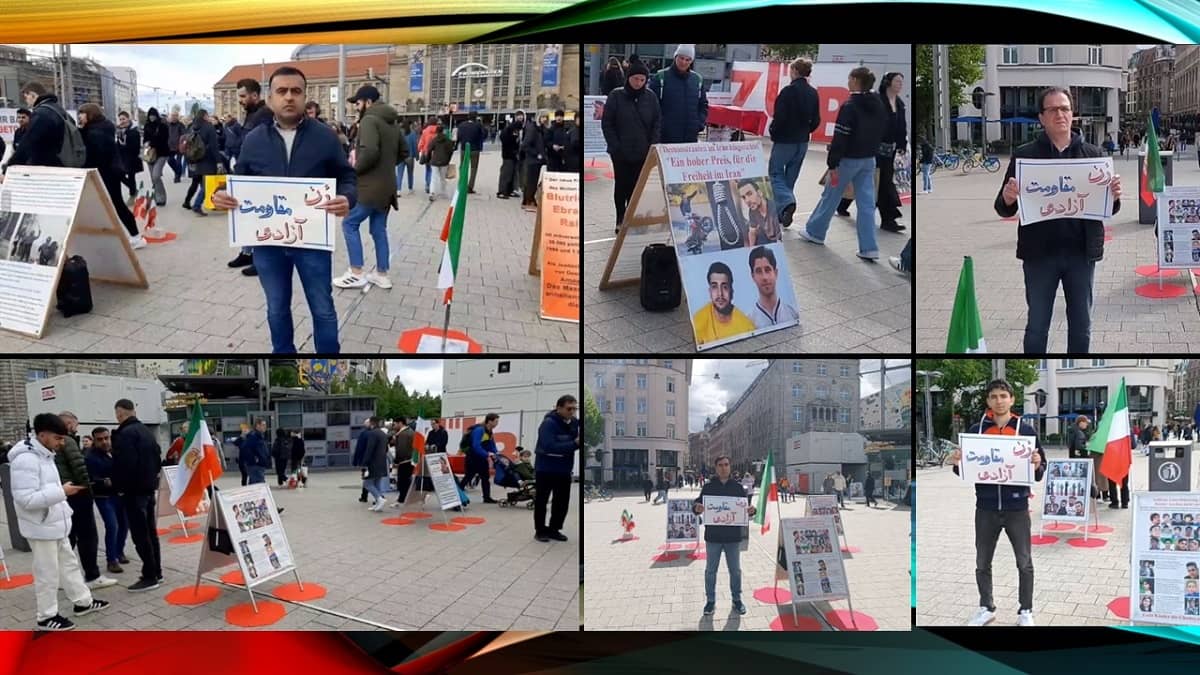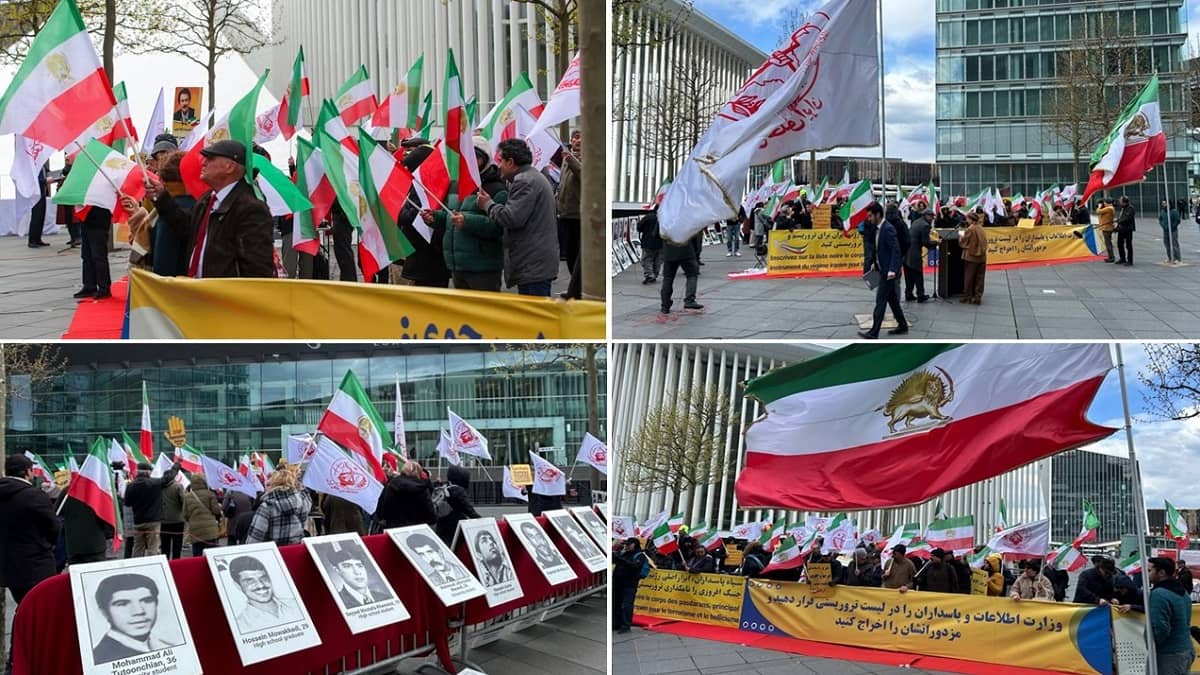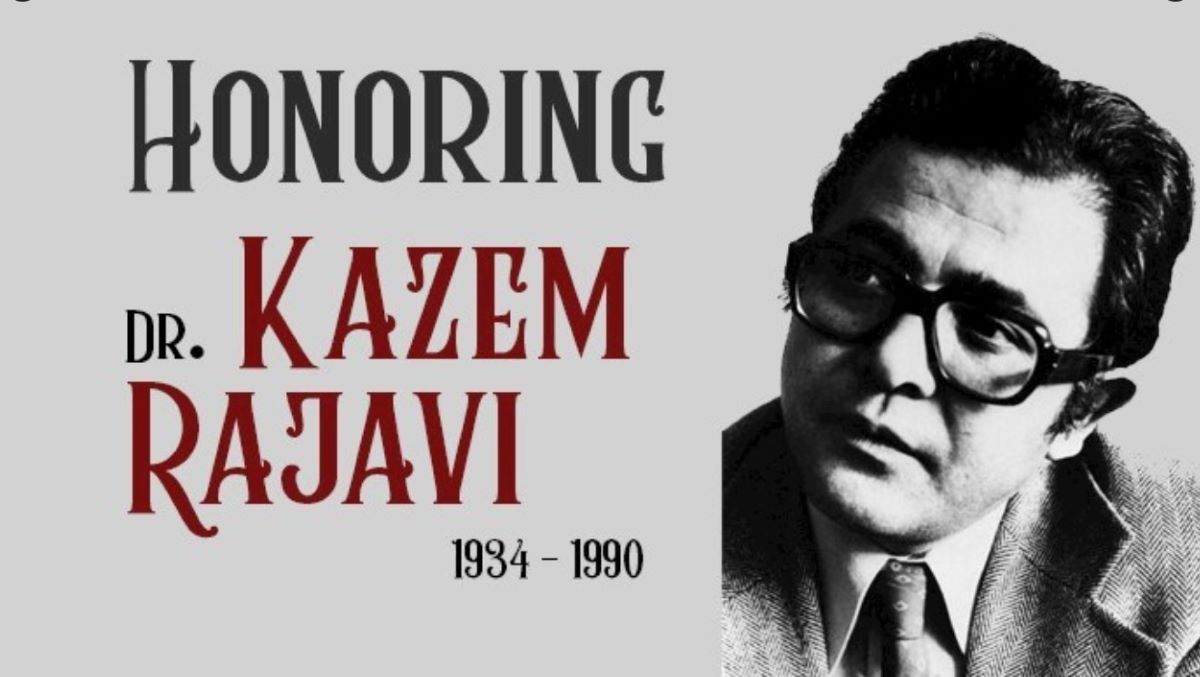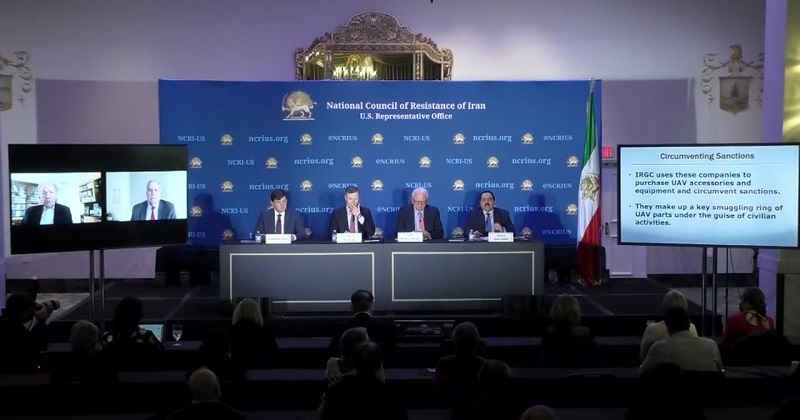
IRGC’s Rising Drone Threat; A Desperate Regime’s Ploy to Project Power, Incite War”
The National Council of Resistance of Iran, U.S. Representative Office (NCRI-US) hosted a briefing on Wednesday, December 15, 2021. The briefing held with the participation of leading national security experts.
The panel discussed an effective Iran policy to address the Iranian regime’s nuclear non-compliance, its missile and UAV program, its regional aggression, the rising public discontent and the first 100 days of Ebrahim Raisi as Tehran’s president.
The NCRI-US also presented its newly published book “IRAN: IRGC’s Rising Drone Threat; A Desperate Regime’s Ploy to Project Power, Incite War.”
Speakers at the briefing:
Honorable Joseph I. Lieberman, former senator from Connecticut.
Ambassador Robert Joseph, former Undersecretary of State for Arms Control and International Security; former Special Assistant to the President and Senior Director for Proliferation Strategy, Counterproliferation and Homeland Defense.
David Shedd, former Acting Director of the Defense Intelligence Agency; former Special Assistant to the President and Senior Director for Intelligence Programs and Reform; visiting fellow, The Heritage Foundation.
Professor Matthew Kroenig, Edmund A. Walsh School of Foreign Service at Georgetown University; Deputy Director, Scowcroft Center for Strategy and Security, and Director, Global Strategy Initiative, The Atlantic Council.
Jonathan Ruhe, JINSA Director of Foreign Policy.
Alireza Jafarzadeh, Deputy Director, Washington Office, National Council of Resistance of Iran; author, The Iran Threat.
Panelists’ speeches are updated below:
Alireza Jafarzadeh, Deputy Director of the Iranian opposition coalition NCRI – US Representative Office, Washington, DC
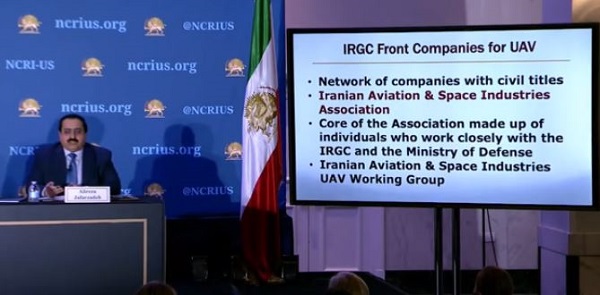
We’re revealing for the first time a number of Revolutionary Guards (IRGC) front companies running the regime’s drone program. These companies have civilian names but are in service of the IRGC. They provide parts and accessories for the UAV program. They are doing what the IRGC can’t do itself. They are helping the IRGC circumvent sanctions. It’s a smuggling ring.
We need to deal with firmness vis-à-vis this regime. It should be granted no sanctions’ relief. It is imperative to reinstate all UNSC resolutions.
Sen. Joe Lieberman, U.S. Senator (1989-2013)
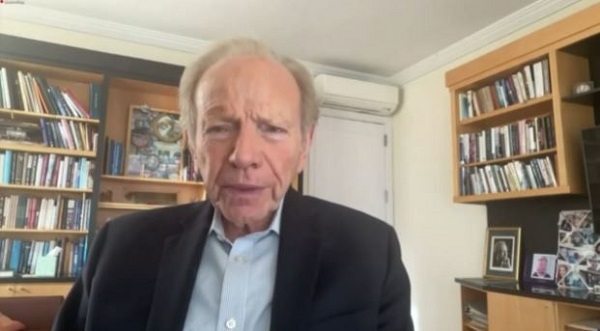
Thank you, Alireza. Thanks for that characteristically compelling report, in this case about the Iranian drone program. I must say that what you’ve just presented, and I’m sure the written report backs it up, reminds us that the NCRI-US is not just an advocacy group, but it also has become a respected think tank, you might say, and even beyond that a kind of independent intelligence agency whose reports have attained credibility. And that’s really contributed to the effort to improve the lives of the people of Iran and also to make the region and the world, including the United States, safer from the threats represented by the current regime in Tehran. So, I thank you, Alireza, and thank all who work with you at NCRI-US.
I’m glad to be able to come in for a few minutes today to join this distinguished panel, and I regret that I have to leave shortly after I speak. But I think it’s an important time for us to be gathering here, as Alireza said, related to what is happening in Vienna with the talks but also in Iran itself.
And I want to step back for a moment and put this in a larger context. The world today obviously is unsettled in many ways. And we have the continuing threat of terrorism to the United States, including terrorism sponsored by the number one state sponsor of terrorism, which is the Islamic Republic of Iran. But in addition, the world is heading back toward a kind of great power competition, particularly with Russia and China. And the Biden administration’s foreign policy I think has emphasized a return to America’s classic democratic values as illustrated in the Democracy Summit that the administration convened in Washington last week. And also we’ve begun not strengthen some of our alliances which weakened a bit in the previous administration, particularly in NATO. But in this focus on China, particularly, there seems to be an opinion rising that the United States is trying to withdraw or at least pull back from the front lines of the Middle East. And to me that is not only a mistake diplomatically in terms of our own security and prosperity and principles, but it’s also effectively impossible because we are too engaged historically and today ion the Middle East.
And this vision was amplified in a very disruptive way by the, in my opinion, the decision to exit from Afghanistan, but also in the way, the chaotic way in which it happened, which sent a message around the world both to our enemies like China or those who challenge us we say like China and Russia, but also to people in the general neighborhood of Afghanistan, including more broadly the Middle East, encouraging a worry in the mind of our best allies in the region, including Israel and the Arab countries, that they couldn’t depend on us as fully as they had over time, and leading to the beginning of interactions with China, strengthening the interactions with Russia, and forming new alliances within themselves to counteract this fear that the U.S. wouldn’t be with them. So, you’ve followed all that detail.
So, here’s the point I want to make at the outset, and I’ll amplify it pretty quickly. I think we’re on the wrong course, we the United States, in our efforts in Vienna to reenter the JCPOA. I think these efforts are well-intentioned, but they don’t meet the reality of what Iran is doing, either in Vienna or in Iran or throughout the region or the world. And I think they’re in that sense unrealistic and risky, highly risky. So, I’ll talk in a moment how I hope they’ll be changed.
But I want to say something else in terms of the larger context. I think it’s not only important that the United States change and toughen our position, in fact to step back from the JCPOA in negotiations as they’re constituted now in Vienna, but generally be tougher with Iran. Not only is that in my opinion the best way to try to move back toward more security and more constraint, containment at least of the Islamic Republic of Iran, but it provides us the U.S. with, as I see it now, the best opportunity to counteract the impressions that were left by the withdrawal from Afghanistan and more broadly to be tougher on Iran as a way to say to our allies, most immediately in the Middle East, “we’re with you. Don’t look elsewhere, don’t be worried about us. We get the threat that Iran represents to you and to us.” And it also will say to those who will challenge us in China and Russia, for instance, that not only does the U.S. follow its principles under President Biden, which is to say democracy and human rights, but we’re willing to stand up and be strong and fight for them, and not be deceived by a country like the regime in Iran which operates totally inconsistent with our values, and of course contrary to our interests.
So, what I’m saying is we’ve got to change course toward Iran, not only as the best way to limit the threat that Iran represents and be true to our values, but also as the best opportunity that we have now to show the rest of the world, friends and enemies, that we’re willing to be tough and use the power economically, diplomatically, and if necessary militarily, that the United States possesses.
So, I will say briefly that—which you all know, so I don’t have to dwell on it—that the regime in Iran that now returns to the table to negotiate over the JCPOA comes to the table with as we used to say when I went to court “with dirty hands.” In the interest of justice, you’re supposed to come to court with clean hands. I mean this is a regime that has recklessly violated the most compelling and important terms of the JCPOA, which was not a good agreement over all. But there were certain requirements on Iran and they’ve broken through them. As you know they’re enriching uranium to a very dangerous level at this point and stated just in the last few days that they’re going to keep doing it until all the sanctions on them were removed, which is outrageous.
Secondly, they’ve continued to be aggressive in the Middle East, both undermining countries like Lebanon, contributing to the tyranny and massacre and enabling it in some ways in Syria, and threatening and actually firing at our allies such as Saudi Arabia and the United Arab Emirates.
It’s very important also to look inside Iran. Consistent with the priority that we give go democracy and human rights. And it’s important I think that we do this particularly so close to the democracy summit that the Biden administration convened just last week, because the regime in Iran has gotten to be more totalitarian in the last year with the coming of Raisi, as Alireza said, a mass murderer really should be spending his time before the International Court in The Hague not in the president’s office in Tehran.
But let me just read you from a report that another group I’m involved with, called United Against Nuclear Iran, recently issued. The Iranian regime executes more people per capita than any other country. It carries out more total executions than any nation but China, whose population is over 17 times more than Iran’s. Iran continues to target political dissidents and ethnic, religious and sexual minorities for execution. Capital punishment can be and often is carried out against juvenile offenders and for nonviolent crimes. This is a brutal, inhumane regime that doesn’t understand what we Americans mean when we talk about the rule of law. And really how can you trust a regime like this, headed by a person like Raisi, really headed by a Supreme Leader Khamenei, who says the most terrible things about the United States of America.
And let’s go briefly to the talks in Vienna. Let me begin with this outrageous demand that Iran made that the U.S. has I think mistakenly accepted, that Iran wouldn’t sit in the same room with the United States of America during these negotiations. I mean this is clearly probably expresses what they believe, but it’s also a tactic to diminish and demean the United States of America. I mean we are the world’s superpower, we’re the greatest democracy in the world. Iran is a much smaller country, led as I said by a totalitarian government, and it threatens us only because it’s so extreme not because it has any power relevant to ours. And yet they determined that the U.S. can not even be at the table to enter into these negotiations. To me that would have been enough for the U.S. to say either we’re in the same room together or the negotiations don’t go forward. And I regret that the other members of the P5+1 acceded to that really offensive demand.
The second is nothing good is happening in those negotiations. As much as we try, and we have tried, the U.S. administration, to give Iran reasons to really negotiate openly and in a way that we could rationally accept, for a while there was talk of a less for less agreement and that was a trap really. And it would end up being less from them and more from us, and only lead us down the road to more danger of their nuclear program much more than we are now.
So, I’m glad that the U.S. seems to have pulled back from that. I’m also encouraged that the administration recently added sanctions on some of those involved, for instance, in the drone program in Iran and other programs. I think we’re moving towards sending a stronger message to Iran. I myself am pessimistic that it will work. I frankly think that we’d be better to leave the negotiations, let them, let the Iranians who desperately need the removal of the sanctions we imposed on them for their wellbeing, let them figure out how to bring us, U.S. and hopefully some of our allies in the P5+1, back to the table. And let us stand with our allies in the Middle East, Arab and Israeli. And most of all, let us stand with the people of Iran who as the NCRI-US and other sources have documented are increasingly opposed to their own government because it doesn’t serve them, it serves a small clique of radical Islamists and corrupt thugs who are making themselves rich while the people suffer.
Obviously, for their violations of the JCPOA and various other international norms, Iran should be brought to the UN Security Council and face punitive action there. But it’s time to stop this game that they’re playing with us, which is dangerous, and gives them time to build up their nuclear program, and to be prepared to have all other options on the table, including if necessary certainly supporting an uprising of the Iranian people against the regime, not militarily but in every other way we can, and also being prepared to, if necessary as a last alternative, to join or support military activities by our allies to demolish their nuclear program before it reaches full viability and production of weapons. There’s no easy path here. What may seem like the easy path maybe in Vienna may seem like the most dangerous. And I think we have in the United States I say as a final word, indicated by some of the recent legislative actions, including the stop the drone program legislation, the beginnings of a return of a bipartisan congressional consensus on Iran, which was sadly, well, destroyed really for a while or certainly ended for a while by the debate over the JCPOA in 2015. The truth is members of both parties really see the threat from Iran and increasingly I think with the advocacy of NCRI and the facts that that the NCRI think tank puts out will be supportive of action, legislation, that will send a tough message to the government in Tehran, which is the only message they will respond to.
Probably talked a little longer than I wanted to, but I have so much in me about the subject. And I thank you for giving me the opportunity and I wish you well in the rest of the program, and I look forward to being with you in person the next time.
Amb. Robert Joseph, Under Secretary of State for Arms Control and International Security (2005-2007)
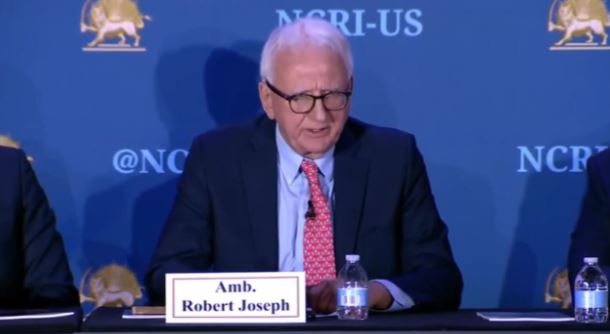
First of all, let me say good morning. And Alireza, thank you, I appreciate the opportunity to join you today with such distinguished and accomplished colleagues and friends. We are, I think, meeting at a critically important time. And I’m, like others, not referring only to the nuclear negotiations in Vienna, which currently dominate the headlines. I am referring to the broader geostrategic interests at play, and specifically the future of the religious dictatorship in Tehran.
Certainly, the Vienna talks can affect that future. The Biden administration continues to seek an agreement, in my view, at almost any cost. Despite some recent tough talk and some recent limited, almost symbolic, steps such as the application of sanctions that we’ve seen in the last several weeks. But overall, the administration seems more than willing, in fact I think it seems enthusiastic, about playing a high price for a bad agreement. And the higher the price, the more resources the regime will have to devote to its nuclear weapons and missile programs, as well as to pursue its aggression in Syria, in Yemen, and elsewhere. And I think most importantly, resources to oppress the Iranian people through brutal force and mass killings.
Senator Lieberman has done a much better job than I could ever do in capturing the essence of what I believe is now a time for decision. The correct decision, both politically and morally, on which we will, I think, be judged by history, is to support the people of Iran in their struggle for freedom and democracy. This is a deplorable regime that wants the United States, Europe, and others to focus not on its internal vulnerabilities, but on the JCPOA negotiations, as those negotiations provide both a sense of legitimacy and a convenient diversion from its desperate domestic situation. And if successful, the result will serve as a lifeline for Iran’s rulers.
I’ll return to this point, but first let me say that the report being released today provides a wealth of information on Iran’s drone program, an increasingly significant tool of the regime. Published by NCRI, the report is informed by numerous sources inside Iran, primarily members of the MEK who at the risk of their own lives, at the risk of their own live have worked to expose the true nature of Iran’s leaders. The high value placed on drones is reflected in the amount of resources that have been committed to acquiring a large and sophisticated UAV arsenal, both through domestic production and through the illicit procurement of advanced components abroad.
Drones have substantial tactical value for the regime. But the principle strategic value is best understood in the broader geostrategic context that I just mentioned. Having lost all legitimacy at home, the regime sees its very survival as a function of its ability to export its influence and ideology outside of Iran. Drones, like ballistic missiles, serve this purpose by providing a means of intimidation and attack. For this reason, the regime will never give up this capability in my view, and in my view this must be a factor in the design of policies and capabilities intended to counter Iran’s aggression.
As the Biden administration continues what I believe is a quixotic attempt to restore the 2015 nuclear accord, it should keep in mind the lessons and the unintended consequences of that agreement, especially the lifting of sanctions and the providing the regime with billions and billions of dollars to devote to weapon systems such as drones. The expectations of the Obama-Biden administration have been proved to be both false and dangerous. And yet we continue to have those same expectations.
The JCPOA was portrayed as a means to engineer positive change inside Iran by strengthening the so-called moderate faction, supposedly headed by President Rouhani against the hardliners. We now know what actually happened to the windfall that was delivered to the regime. The money that was not siphoned off through corruption was used to acquire even more deadly arsenals of missiles, drones and other weapons to support the murderous Assad regime, the Houthis, and others including Iran’s terrorist proxies. The Biden administration in rejecting these concerns has stated that rejoining the JCPOA is only the first step, a step that will be followed by negotiations to address the agreement’s flaws such as its failure to limit ballistic missiles and curb Iran’s malign behavior in the region. Yet we all know, we all know that when U.S. sanctions are lifted as a condition of rejoining the agreement, it will be the last step not the first step. The U.S. will have again paid a high price for a bad deal, a price that includes more missiles, drones, more aggression, and more repression.
The illusion that Iran can serve as a stabilizing force in the region can only be explained by the triumph of hope over experience. But perhaps the greatest fallacy of the Biden approach is the belief that it can negotiate in good faith with this regime and that if there is an agreement, Iran will live up to its commitments. On this score, people matter as much if not more than stated policy, and the team installed by the Supreme Leader after the fraudulent elections this past September makes evident that the underlying assumptions of the Biden strategy will only produce further failure. Just look at the rogue’s gallery that constitutes the new Iranian leadership, at least ten of whom are currently sanctioned by the United States, Europe, and the United Nations.
Foremost of course is President Raisi, who served as a member of the death committee in the murder of thousands of political prisoners in 1988, a true crime against humanity that has recently been described by over a hundred European parliamentarians as an act of genocide. These executions aimed primarily at the MEK have been widely condemned for decades, with human rights groups calling for an investigation into Raisi’s part in the killings. In 2019, the United States condemned Raisi’s appointment as the head of Iran’s judiciary and sanctioned him, citing his role in the mass executions and his participation in the brutal repression of protesters following the 2009 sham election. The selection of Raisi as president reflects, in my view, the moral bankruptcy of the mullahs, and most of all it reflects their fear of the Iranian people’s call for justice.
Today the mullahs’ desperation is palpable. We can see it in the calls across Iran for an end to the corrupt regime. The people of Iran have seen their beloved country become a prison to those inside and a pariah to those on the outside.
President Biden stated at the recent democracy summit just last week that the world is at an inflection point in the competition between democracy and autocracy. And on this point, he’s correct. But he should practice what he preaches. The choice is clear, we can pursue misguided and failed policies that provide resources to the oppressors, or we can support the Iranian people in their struggle to overthrow their oppressors through regime change from within.
It’s a false choice but one that we hear frequently that we must choose between diplomacy and war, between negotiation and war. But appeasement of evil regimes through diplomacy is the wrong choice, as we know from history, and it often leads to war. The right choice is not war or military invasion. The right choice is to support the resistance to this regime, the resistance that upholds the values of democracy and human rights. Mrs. Rajavi’s plan of action, the well-known 10-point plan, provides exactly that vision. And the organized opposition within Iran provides the means to achieve the goal of a free Iran. Thank you.
David Shedd, Acting Director of the Defense Intelligence Agency (2014–2015)
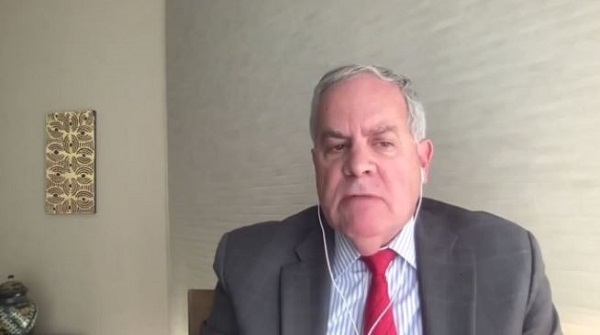
Good morning to everyone. And Alireza, thank you for this opportunity to join you today on what is a very, very important topic. And as both my predecessors on this august panel have already commented, and they’re a very tough act to follow.
I can tell you that there is no topic of greater interest and of greater priority than this one in terms of talking about Iran, its behavior, where the United States stands on it, along with its allies, and at the present time in terms of the impact it has not only inside Iran, which others have already spoken so eloquently about and I’m sure we will hear from the fellow panelists further about that, but also in its near abroad and then its reach around the globe in terms of promoting its hardline policies.
Serving as an intelligence officer, I also want to thank the NCRI, much as Senator Lieberman recognized, that you are in essence an intelligence organization, collecting at great peril information inside a despotic environment in which you can quite literally say take no prisoners when it comes to collecting on the UAV program and many of the other aspects that you are engaged on. And then finding a way to share this with the public and have that awareness created by the great work that you are doing in terms of sensitizing the world as it pertains to the activity of this despotic regime.
When I think about Iran and the motivations that I even had in joining the intelligence services in the United States, it was really in 1979 and the hostage taking that was a primary motivator to dedicate my career for over three decades to intelligence and understanding regimes like Iran and how to counter their activities. What I find fascinating by way of a backdrop is that the Iranian regime, really since 1979, has had a very expansive definition of what it believes constitutes a foreign policy by being consistently on the offense. And by being on the offense, I mean they have taken matters in their own hands in where they will go anywhere at any time and their reach is pervasive and ubiquitous in going after anybody that expresses dissent. And to this end, we know full well that this regime for now over 40 years has continued to target dissidents abroad. It has targeted journalists. And there is no end in sight in terms of their support for those who are willing to speak up and then become the target of their wrath.
And to that end, when I think about the attempted to the actual assassinations in about five countries since 2015/2016 in Europe, in the Middle East, and even in the Americas, I find that there is no sign of diminishing their intent to go after those who oppose the regime and speak out for the kinds of values that Senator Lieberman and Ambassador Joseph have already referred to. And to that end, I think the fraudulent election associated with Raisi and the Supreme Leader Khamenei’s role in supporting this is only going to become more hardline in terms of the pursuit of their opposition in their near abroad and anywhere around the globe that it expresses itself. And there is no limits to what they might use by way of the tools in their kit to do this.
Let me just point out three things that I want to emphasize before very briefly addressing what to do in a response to add to what both Senator Lieberman and Ambassador Joseph have so eloquently shared by way of a response to the Iranian regime, all of which I fundamentally support. Issue number one is the asymmetrical use of technology provides to Iran. Their ability, for example, and there is no current better example that you have provided to this wonderful report in terms of the richness of it, of the UAV drone program. This is a technology which has gone in the past two decades from being unattainable by the vast majority of countries to highly reachable in terms of both price point and then capabilities in which to use the drones. But it is just simply one example of many in which the asymmetrical nature of the technology that is available at market price to a despotic regime that they can use to provide pervasive either surveillance or in some cases even kinetic capabilities as a result of that.
The second observation is the internet, and the ability by Iran at a fairly high level of sophistication to use the internet as a means for targeting people be it through their fishing exercises and attempts as well as disruptive attempts as we saw with the case of Saudi Arabia and (Aramco) and their ability to go after their defined adversaries in a way that they use the 1s and 0s to pervasively go after them in that regard.
And the third observation that I would make is their proclivity, and that requires two sides of that equation, to enter into agreements with what is emerging, and Senator Lieberman talked about this return to greater power competition or great power competition. In the case of China and Russia. And the two regimes in the case of Xi Jinping in Beijing, and Vladimir Putin in Moscow, who clearly do not share American values or certainly the traditional American values of democracy and human rights, and the partnerships that they’re making which are longstanding in the nuclear file in terms of Iran and missile file as well in terms of Iran, but this is broadening and deepening in the sense of those ties.
So how do we respond to it? It occurs to me that the last thing you want to do is take the foot of the proverbial pedal on the pressure on the Iranian machine. And this idea that any kind of lifting of sanctions or lifting of providing sanction relief will be met with a response of kindness and understanding and making concessions on the part of the regime is an entirely false premise which is not supported by history in any way, shape or form. So, one is continuing the pressure. And Alireza, you clearly made that point in your opening remarks.
Secondly, it’s finding ways, as Ambassador Joseph has already referenced, how do you support the internal opposition so that the focus of the regime continually goes back inside Iran as opposed to the export of their nefarious activities, be it in Iraq, Lebanon, Syria and elsewhere around the globe so that they have to attend to the kind of internal pressures that emerged from that opposition, which as you pointed out, Alireza, is becoming stronger and more vocal in recent times. And so this is an opportunity for the Biden administration to actually show support for the internal opposition. And by doing so one of the thing that I would argue vehemently for is to bring them the internet through satellite and access to outside information as I think people long to be free and long to have information delivered to them in a manner that is uncontrolled and unconstrained as the regime clearly wants to do.
And thirdly, it’s to again use the international forums but with the United States in the leadership to really keep the human rights issues at the forefront and place the regime clearly in the crosshairs of one of if not the greatest human rights violator in the world at present time, along with China and its treatment of the Uyghurs and elsewhere, but certainly all in that category of countries.
I look forward to the questions from the audience, and with that I will turn it back to you with those initial thoughts at this point. And again, thank you for this opportunity.
Matthew Kroenig, PhD, American political scientist and national security strategist
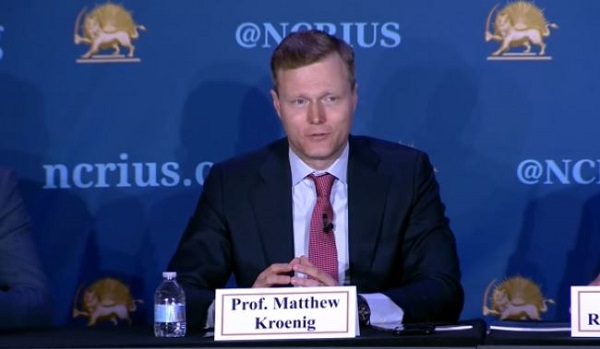
Thank you very much, Alireza, for the invitation to be here today. Thanks to all of you for attending this discussion on this important issue. Thanks to my distinguished co-panelists.
I have been focused on the Iranian nuclear challenge, in and out of government, over the past 20 years. And I’ll get to that in a moment, but I did want to begin also by congratulating NCRI on this report. It’s really amazing, I think, over the past 20 years the kind of information NCRI has been able to provide on the Iranian regime’s activities, going back to some very foundational revelations on the nuclear program almost 20 years ago, and all the way to this report today. And if you haven’t read it yet, I would recommend that you do. It’s really remarkable the level of detail they get into in terms of Iranian drone production capability.
And this is a real threat currently in the region. These drones have been used to kill Americans in Iraq, to attack Saudi oil facilities. So Iran is using this drone proliferation to further their goals in the region by destabilizing the region. And so I think understanding this threat is important. So, congratulations.
Also before I turn to the nuclear threat, I also wanted to come to this idea of the Biden doctrine that some of my colleagues have referenced. Whenever there’s a new president, people ask what is the president’s foreign policy doctrine. And it seems that the emerging Biden doctrine is this idea that we’re at an inflection point between democracy and autocracy and we need to rally the democracies, like at the Summit for Democracy last week, to take on these revisionist autocracies that are challenging the United States and its allies, challenging the rules-based international system. And it seems like a lot of the focus though is on China primarily and then to a lesser degree Russia. But I think as we think about this global competition between democracies and autocracies, we should also consider the Iranian regime as part of this. Just like China challenges us in the Indo-Pacific but globally, Russia is challenging the United States and its democratic partners in Europe, Iran is doing the same thing in the Middle East. And increasingly, Russia, China and Iran are working together: arms sales, military exercises. And so sometimes I think people think of Iran as a regional issue but I think it is really a part of this global competition between democracy and autocracy.
And in fact last year, a lot of my background is in nuclear issues, but last year I published a book called The Return of Great Power Rivalry: Democracy vs Autocracy from the Ancient World to the U.S. and China. And I think there is a lot of pessimism in some Western capitals that are democracies are polarized and dysfunctional. Maybe the autocracies have the upper hand. They have firm leadership, they can plan for the long-term, they can impose decisions on their system. Meanwhile we’re fractious and polarized. But actually my book came to a different conclusion that actually democracies have real advantages in these competitions, autocracies have real weaknesses. And I think this is true in Russia and China but certainly if you look at the Iranian regime.
There’s a lot of focus on the sanctions but the real cause I would say of the struggling of the Iranian economy is the regime’s mismanagement of the economy. Diplomatically, the aggressive foreign policy of this region I think has led much of the rest of the world to counterbalance against it. And then it has the same military and security challenge that all dictatorships do, which is that it fears its own people more than it fears external enemies. And if you look at the behavior of the Iranian regime, it spends an awful lot of resources and attention on repressing and abusing the Iranian people.
So, it should be apparent in what I said already, but this isn’t a conflict between the United States and Iran, it’s really a conflict between the current regime in Iran and really much of the rest of the world that wants to have a functioning rules-based international system, but countries like Russia, China, and Iran are challenging that.
Okay, so let me come to the nuclear challenge, and this is significant. First, Iran is close to having a nuclear weapons capability. In order to build nuclear weapons, it essentially needs to do three things. It needs to have enough highly enriched uranium. It needs to have the ability to fashion that into a nuclear warhead. And it needs the ability to deliver that against its enemies.
Many assess that Iran already ahs the ability to build at least a basic nuclear warhead. Iran already has the ability to deliver nuclear weapons against its enemies. It has the most sophisticated ballistic missile program in the Middle East. And so the last remaining piece is the uranium enrichment.
And so people have focused on this breakout time: how long would it take the Supreme Leader to dash to one bomb’s worth of weapons-grade uranium? And right now, outside experts are estimating that this breakout time has shrunk down to as little as three weeks. So if the Supreme Leader made the decision today to enrich as much uranium as fast as possible, that he could be essentially to the point of no return within three weeks. So this is really I think the worst position we’ve ever been in, including worst than in 2012 in the runup to the last deal.
Why do we care about a nuclear-armed Iran? It poses a number of obvious threats. It could lead to further proliferation of nuclear weapons in the region and to terrorist groups. If Iran is backstopped by nuclear weapons and a nuclear threat, I think the regime would engage in more aggressive course of diplomacy and support to terrorism in the region and around the world. And there would be a risk of nuclear war. I don’t want to exaggerate that, I don’t think it’s high. But the risk is not zero. There would be I think serious crisis between a nuclear-armed Iran and nuclear-armed Israel, nuclear-armed United States. And any one of those could spiral out of control. And once Iran has intercontinental range missiles, which is something that it’s working on, could result in a nuclear attack on the U.S. homeland. So, this is a serious threat. I think some of our partners are correct to say this is an existential threat.
So what to do about it? And I’ll wrap up there. Let me first address Alireza’s good question. Of course, this nuclear program is not the result of the United States’ withdrawing from the JCPOA. This is something the Iranian’s have been working on for 20 years. They carefully negotiated the JCPOA, so they could continue to advance their nuclear program, even with the deal in place. And then, as Alireza correctly points out, they weren’t even living up to the strict terms of the deal even while the deal was in place. So, I think we need to keep our focus on the problem. The problem is the Iranian regime, not President Trump or his decision to withdraw from the agreement.
So what do we do about it? I think an engagement and pressure track makes sense. I think it’s fine if the Biden administration and others want to try to talk to the regime. I think it makes sense to talk to your enemies. But we need to have a stronger pressure track. I think the regime needs to understand that it can’t muddle through and get to a nuclear weapon, that if it continues on the path that it’s on that there are going to be unacceptable consequences.
So I think there are a number of ways we can dial up economic pressure including secondary sanctions on Chinese purchases of Iranian oil. I think there are things we can do to make the regime worry more about its domestic insecurity issues, as David Shedd correctly pointed out, supporting the democratic aspirations of the Iranian people. And then I do think we need to put the military option back on the table as a last—well first to support diplomacy. I think that’s one thing that will concentrate minds of many of the diplomats in Vienna, if they know that their efforts fail the result will be military strikes on Iran’s nuclear facilities. And then as a last resort to prevent Iran from building nuclear weapons if necessary.
So I think by following a strategy like that, we can keep Iran from building nuclear weapons. But I think the ultimate goal, as many of my colleagues have pointed out, is to one day have a better government in Iran that respects the human rights of its own people and that follows a more cooperative foreign policy internationally. So I’ll end my remarks there and look forward to the discussion. Thank you.
Jonathan Ruhe, JINSA Director of Foreign Policy
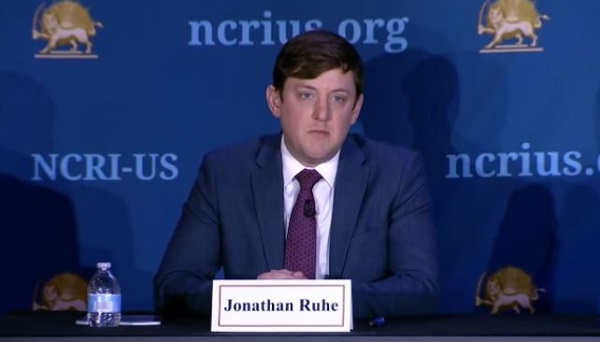
Thank you very much, Alireza. It’s an honor to be back here with NCRI-US. I and my organization support the goals of NCRI-US. And we’ve been focused on addressing the comprehensive range of challenges posed by Iran both to the Middle East, the global order more generally, and also inside Iran itself.
I’m going to pick up on an issue that has been addressed at the broader strategic level, but I’m going to jump down a little bit to more operational considerations, which is Iran’s growing use of drones or UAVs. I would join my panelists in recommending the new book that’s been released today. As someone who’s been citing this issue for years, there just is a wealth of new information on the structure, roles, organization, capabilities of Iran’s growing drone program. And I’m really specifically going to pick up on one issue which the book lays out in great detail, which is Iran’s use of drones to project power around the Middle East gives it an ability to compensate for many of the internal inherent weaknesses of the regime that have already been laid out very well by the preceding panelists.
And so what my organization does, and what I’ll use as the stepping off point from the book that’s been released today, is what we call the Iranian projectile threat. And drones are central to this, but we also look at non-nuclear ballistic and cruise missiles, because I think they’re increasingly of a kind in terms of how Iranian is improving these capabilities and how it seeks to use them. And I would just point out that often drones of the type that Iran uses for attacks, which are often sort of one-way kamikaze drones where the vehicle and the warhead are one in the same, are often referred to as a poor-man’s cruise missile. So, we’re talking about sort of overlapping set of capabilities here.
So, the bottom line is essentially that Iran is able to compensate for its weakness at home, projects strength abroad, due to a combination of three factors it’s exploiting I think in a very sophisticated fashion. The first, as the book lays out, is Iran’s concerted improvements to its drone and missile capabilities just in the past five or six years, especially since it enjoyed all the sanctions relief from the JCPOA nuclear agreement. Iran has plowed millions of dollars, the figures range, but certainly it’s made a concerted effort to improve the range, the payload, the maneuverability, and the accuracy of its drones and cruise missiles to the extent where they can pose capable threats not only to point targets around the region, but also even more mobile targets like ships plying the Persian Gulf or even the Red Sea. And so, Iran increasingly uses drones and missiles in mixed swarms to overwhelm the region’s air defenses, and it does, so I think, in a startlingly effective manner which I’ll get to in just one second.
The second factor, as the new books points out, is Iran’s ability to proliferate these capabilities around the region. Yemen, Lebanon, Iraq, Syria, while also using Iran itself as a base for launching these attacks. And what that does is it essentially encircles the Middle East, U.S. allies in the region, and U.S. bases in the region, with overlapping fields of fire, or as the Israelis call it, the ring of fire. So, you can’t just look at attacks coming from one direction,. You have to have sort of a 360 perspective. And this further complicates air defense efforts by the United States and our allies.
And thirdly, and I think this is somewhat underappreciated, is the lack of strategic depth in defense by the United States and our allies in the Middle East. The famous statistic that I’m sure you’ve heard before is a concerted attack on Saudi Arabia’s lone desalination plant could essentially deprive the country of potable tap water for a year. But you look at ports, seaports, skyscrapers, palaces, each of the countries in the region, these valuable strategic assets and critical infrastructure are all concentrated in a very small number of targets that Iran can hold at risk for the reasons I’ve laid out. And so what this creates is a situation where Iran’s drones are becoming weapons of mass effectiveness that help compensate for the regime’s weakness at home and give them strategic leverage.
Just very quickly, it was mentioned earlier this 2019 attack on the Saudi energy facility at Abqaiq and this was sort of Iran’s, for lack of a better term, proof of concept for this new range of capabilities. And it checks all three of the boxes that I just laid out. It was a mixed swarm of long-range drones and cruise missiles, 25 in total. The attack came from an unexpected direction. I think the Saudis understandably expected such an attack to come from the south, from Yemen. It came from the north, from Iran. Again, as the book lays out in greater detail than I’ve seen before. And thirdly, it targeted critical infrastructure. It hit one of the world’s biggest oil processing facilities. And I think tellingly, the debate inside Iran when they were getting ready to hit Abqaiq is they also looked at a U.S. military base, a seaport, and an airport before they finally decided on striking the oil facility. And from experts I’ve spoken with in the region, this attack could have been much, much worse than it was. It was successful. Most of the drones and missiles hit their targets accurately. But if Iran wanted to, this could have been much more dangerous and catastrophic.
And just to close out my remarks, since that attack on Abqaiq you’ve actually seen drones become increasingly central to Iran’s projection of power around the region, its threats and attacks to the United States and our allies. In 2018, when the Trump administration left the JCPOA, Iran used drones for about 19% of its attacks around the region. Today that number is tripled to about 60%. Additionally, three years ago, Iran used an average of just over one drone per attack. That also has tripled, which reflect this growing use of these capabilities in swarms to overwhelm and confuse air defenses. So it’s certainly a growing problem.
I hope my comments have amplified what the book lays out in great detail. And I would just say in terms of steps going forward, things the United States and our partners can do, I think one is look at the Middle East and the changing strategic context in the region. In just the past year plus, driven largely by a shared threat from Iran, we’ve had the Abraham Accords, which while most of the cooperation has been economic there is room to bolster defense cooperation in the region, including I think one of the highest priorities would be greater efforts to integrate regional air defenses. That’s a high bar but there are certainly steps the United States can take with its allies in the region to begin bolstering those defenses and countering Iran’s ability to impose costs and develop strategic leverage throughout the region.
Secondly, and this picks up on what many of my preceding colleagues have said, is genuine sanctions enforcement on a lot of Iran’s ability to obtain dual-use materials to enhance its drone program, and also penalize countries that help Iran further these capabilities. Because I think what we’ve seen so far has been laid out before, the Biden administration is conspicuously underenforcing sanctions as a way to try to keep Iran at the table and find a way to say yes to reentering the JCPOA or some even worse less for more deal.
And then finally, I think it would send an important signal to Iran, especially as we’re sitting with them, or sitting at a different hotel from them in Vienna, signal that the United States is serious about considering other options. Iran does this all the time, we saw it in the past two years around the Middle East. They’re willing to talk with us, or indirectly to us, at the same time they’re willing to ratchet up the pressure through kinetic attacks around the region. And by and large, I think the U.S. response has largely been deafeningly silent.
We just stood up a new task force in the Middle East, Task Force 59, to use unmanned platforms specifically for maritime security. I think this is a great area where the United States can start deploying unmanned capabilities to protect a lot of our assets around the Middle East, especially in the Persian Gulf, to begin denying Iran the ability to tactually carry out a lot of these attacks, which I think if left unchecked will only continue to grow. So, thank you very much.

